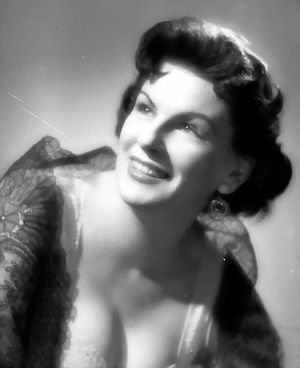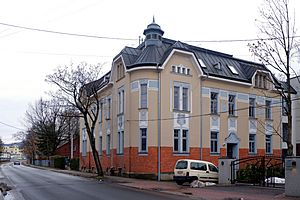Maria Koterbska facts for kids
Quick facts for kids
Maria Koterbska
|
|
|---|---|

Maria Koterbska during the 1950s
|
|
| Born |
Maria Koterbska
July 13, 1924 Biała, Poland
|
| Died | January 18, 2021 (aged 96) |
| Occupation |
|
| Spouse(s) |
Jan Frankl
(m. 1950; died 2020) |
| Children | 1, Roman Frankl (b. 1954) |
| Musical career | |
| Genres | swing, jazz |
| Instruments | Vocal |
| Years active | 1949–2013 |
Maria Koterbska (born July 13, 1924 – died January 18, 2021) was a famous Polish singer. She was very popular in the 1950s and 1960s. Some of her biggest hit songs include Augustowskie noce, Karuzela, and Serduszko puka w rytmie cza cza.
Contents
Her Music Career
Maria Koterbska started her singing career on New Year's Eve in 1949. In the 1950s, she often appeared on a popular radio show called Melodie świata from Radio Katowice. Her performances made the show very popular.
Around the mid-1950s, she also performed at the Satirical Theatre in Kraków. These two years helped her change her singing style. She moved from jazz songs to theater songs, which needed a different way of using her voice. During this time, her song Wio koniku became extremely popular.
Many of her early recordings were lost. However, some of her hits from the 1950s were later featured in a special collection in 1967. A composer and arranger named Jerzy Harald helped her a lot. He created many songs for her, including "Brzydula i rudzielec".
Working with Kabaret Wagabunda
From 1956, Maria Koterbska joined a group called Kabaret Wagabunda. She was the main star of their shows. They performed concerts all over Europe and for Polish communities in the United States. They recorded many cabaret songs together. She performed with other famous artists like Lidia Wysocka and Jacek Fedorowicz.
Wiktor Kolankowski and later Tomasz Spiewak were the musical directors for the band that played with Maria Koterbska. Her partnership with Tomasz Spiewak lasted for a very long time.
Touring and Festivals
Even while working with Wagabunda, Maria Koterbska took part in many other shows. She sang in popular radio programs like "Zgaduj zgadula" and "Podwieczorek przy mikrofonie".
In 1961, she went on a tour to the Soviet Union. Her group was the first Polish band to perform for audiences there. Maria Koterbska was very well-liked.
In 1963, she was invited to the Sopot Festival, a big music event. She sang a song called Odejdź smutku and won second place. This performance surprised many people. She was known for popular hits, but at Sopot, she showed she could also sing more difficult and artistic songs.
Later Career and Awards
In the 1970s, Maria Koterbska released two music albums. She also performed at the KFPP in Opole. In the 1980s, she became a judge for the KFPP festival. In 1987, she received a special award called the Honorary Grand Prix at the festival.
Towards the end of the 1970s, she started performing with her son, Roman Frankl. He is an actor and singer, and he also composed some of her songs. In 2007, she took part in a concert honoring another artist, Jacek Lech.
Maria Koterbska also appeared in a few films, including A Matter to Settle and Irena do domu!.
In 1999, Maria Koterbska was given a high honor called the Officer's Cross of the Order of Polonia Restituta. This is a very important award in Poland.
Her Personal Life
Maria Koterbska was born in July 1924 in Bielsko, Poland.
Her husband was Jan Frankl. They had one son, Roman Frankl, who became an actor and singer.
Maria Koterbska passed away in Bielsko-Biała, Poland, on January 18, 2021. She was 96 years old.
Famous Songs
- „Asmodeusz” (music by Bogusław Klimczuk, lyrics by Tadeusz Urgacz)
- „Augustowskie noce” (music by Franciszka Leszczyńska, lyrics by Andrzej Tylczyński and Zbigniew Zapert)
- „Brzydula i rudzielec” (music by Jerzy Harald, lyrics by Eugenia Wnukowska)
- „Chłopcy z obcych mórz” (music by Ryszard Sielicki, lyrics by Andrzej Bianusz)
- „Cowboy Jackie” (music by Adam Markiewicz, lyrics by Andrzej Tylczyński)
- „Deszcz” (music by Jerzy Wasowski, lyrics by Jeremi Przybora)
- „Do grającej szafy grosik wrzuć" (music by Günter Oppenheimer, lyrics by Mirosław Łebkowski)
- „Dziś nie wiem, kto to jest” (music by Roman Orłow, lyrics by Andrzej Bianusz)
- „Hallo, hallo, hallo, hallo” (music by Adam Markiewicz, lyrics by Andrzej Tylczyński)
- „Karuzela” (music by Witold Krzemiński, lyrics by Ludwik Starski)
- „Klip klip, klap klap” (music by Adam Markiewicz, lyrics by Andrzej Tylczyński)
- „Mój chłopiec piłkę kopie” (music by Jerzy Harald, lyrics by Eugenia Wnukowska)
- „Nie mówimy, że to miłość” (music by Camillo Bargoni, Al Stillman, lyrics by Jeremi Przybora)
- „Nie o mnie” (music by Marian Radzik, lyrics by Marian Załucki)
- „Serduszko puka w rytmie cza cza” (music by Romuald Żyliński, lyrics by Janusz Odrowąż-Wiśniewski)
- „Si senor” (music by Ryszard Sielicki, lyrics by Kazimierz Winkler)
- „Zakochałam się w zielonych oczach” (music by Adam Markiewicz, lyrics by Andrzej Tylczyński)
Discography
- 1960 – Maria Koterbska śpiewa wesołe piosenki
- 1960 – Ulubione przeboje
- 1960 – Ulubione piosenki
- 1967 – Nie mówmy, że to miłość
- 1972 – Maria Koterbska
- 1974 – Jubileusz
- 1980 – Maria Koterbska
- 1990 – Życie zdarza się raz
- 2010 – 40 Piosenek Marii Koterbskiej
Filmography
- 1948 – Skarb (as a singer)
- 1953 – Sprawa do załatwienia (sang a song)
- 1955 – Irena do domu! (as a singer)


